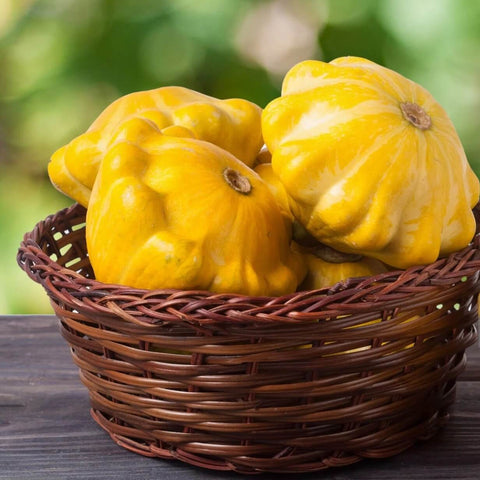

Hortinova
MARIGOLD - Open Pollinated Summer Squash Seeds
Cucurbita pepo
- Medium maturity.
- Patty pan type summer squash.
- Golden, yellow-colored fruits
- Attractive scalloped edge
- Very productive variety.
- Open-pollinated seeds.
- Natural, Untreated, Non-GMO Seeds.
Zucchini and squashes are tender plants which need heat to germinate, so are best sown indoors in mid- to late spring, right about when the last frost is expected. Sow single seeds 1 in (2 cm) deep into cells or small pots filled with potting mix, water well, label, and cover with a clear plastic bag or a lidded propagator and place on a warm windowsill.
Direct outdoor sowing into soil improved with plenty of organic matter is possible in early summer. Place two seeds into one hole 2 in (5 cm) deep at stations 3 ft (90 cm) apart. Cover with soil, water, then protect under a cloche for additional heat.
PLANT OUT: Before transplanting, prepare the soil for these hungry plants by incorporating plenty of well-rotted manure or compost. Create a mound of soil about 6 in (15 cm) high on heavy soils to aid drainage. Harden off plants by acclimating them to outdoor conditions over 2—3 weeks. Zucchini and squashes can also be grown in large containers or grow bags.
Space plants 3 ft (90 cm) apart; place them in the soil at the same depth as they were growing in their pots, firm the soil gently around their roots, and water. Cover with cloches to protect their delicate stems from breezy conditions.
WATER AND FEED: These soft plants are prone to stem rots, so only water them in dry weather or if growing in sandy soil. Plants grown in pots, however, will need frequent watering—daily or even twice daily in summer—to support their rapid growth. Feed container grown plants with a liquid tomato fertilizer twice a week after their first fruits have formed. Plants growing in the open soil only need feeding if they are not growing vigorously.
POLLINATE: Zucchini and squashes produce separate male and female flowers, and insect pollination needs to occur for fruits to form naturally. Yields can be improved, particularly in cold or wet spells of weather, by hand pollinating the female flowers, which have a small, immature fruit below them. Do this by picking an open male flower with a long, thin stem, removing its yellow petals and pushing it into the center of a female flower.
Zucchini and summer squashes taste best when young. Harvest by twisting or cutting from the plant. Picking when young encourage the production of more flowers and fruits, and avoids having to deal with gigantic watery marrows later in the season.
For large winter squashes, limit each plant to three fruits by pinching out the growing tips of plants and removing all unwanted flowers. Winter squashes should be left on the plant to develop. At the end of summer, remove any leaves shading the fruit and allow their skin to harden in the sun. Harvest before the first frost by cutting, leaving a length of stem attached. Store in a dry, frost-free place and they will keep for several months.
Let customers speak for us
from 23 reviewsWe grow several varieties of various colours of tomatoes, and the contrast of these tomatoes with other colours is fantastic. We've had a very long season with our plants, excellent disease resistance, great flavour.

This review applies to all of the seeds I purchased from Hortinova - beautiful tomatoes, good disease resistance and excellent production. Our field season extended to 10 weeks. We've had comments of excellent flavour from our customers as well, highly recommend any Hortinova seed.

This tomato is good taste tomato. Small red round tomato. Bigger then cherry tomatoes but smaller then regular one. I like it. Perfect for salads and fresh eating. Ordered seeds for next season.

2nd time ordering. Very satisfied with qualify and result. Thank you

BALCONY YELLOW F1 - Hybrid Cherry Tomato Seeds

Delivered very fast, packed very good, in professional condition and quality. Thanks

DUETT - Open Pollinated Radish Seeds

We will see what they are like this summer.

Type crimson de bonne grosseur avec une superbe uniformité et très hâtif. Un des premiers prêt en saison. Semences très petites et peu nombreuses. Goût très sucré et chaire croquante. Chair passant du rose au rouge en cours de saison. Les plants sont forts et très vigoureux avec des grosses feuilles.

Vigueur des plants impressionante avec des fruits résistants aux fissures et aux dommages. Très bonne conservartion et goût très sucré lorsque les nervures deviennent orange. Peu être récolté lorsque les nervures sont vertes également. Cavité des semences très compacte et petite laissant beaucoup de chair.

Melon qui fond en boûche avec un goût se rapprochant du melon miel et du cantaloup à la fois, très sucré. Faire attention aux irriguations lorsque le melon devient mature car il peut fendre au champs. Très odorant.

Avec son apparence côtellée, son très gros calibre et ça couleur rose, cette tomate se démarque des autres sur les tablettes. Variété plus résistante à la pourriture apicale que la plus part des autres tomates roses. Bon ensemble de résitance aux maladies également.

Tomate noire dont les faces qui ne sont pas exposé au soleil passent du vert au rouge lorsque mature donnant un aspect unique aux fruits. Charactéristiques similaires à la Barrio avec un goût superbe sans acide. Les clients l'on adoré.

Superbe adaptabilité et excellente résistance aux maladies. Fruits uniformes qui ne fendent pas, bonne conservation. Ajoutez à cela un goût unique avec une légère acidité et une pointe sucré.















